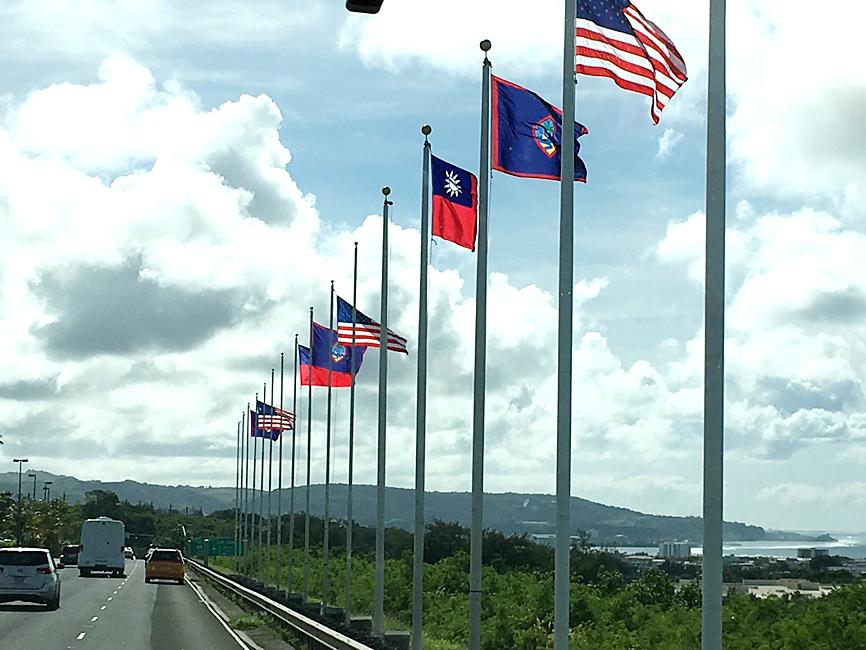The reopening of the Taipei Economic and Cultural Office (TECO) in Guam, which had been set for this month, would be postponed due to the COVID-19 pandemic, the Ministry of Foreign Affairs said yesterday.
Guam Governor Lou Leon Guerrero on Monday last week said that she tested positive for the virus, but added that she only exhibited moderate symptoms and would continue to lead the fiscal and COVID-19 response teams from home.
As of yesterday afternoon, the US territory of nearly 168,000 people had reported 577 confirmed cases, with five deaths.

Photo: Chung Li-hua, Taipei Times
The Guam office is expected to reopen at the end of next month, but there is still uncertainty amid the pandemic, ministry spokeswoman Joanne Ou (歐江安) told a news conference in Taipei yesterday.
The office was closed in 2017 due to budget and personnel allocation issues, while its re-establishment reflects closer Taiwan-US ties and the growing strategic importance of the Pacific region, the ministry said previously.
The ministry’s work with the US focuses on boosting bilateral cooperation — including in defense or trade — working to lift restrictions on bilateral exchanges and continuing to invite US Cabinet officials to Taiwan, Department of North American Affairs Director-General Douglas Hsu (徐佑典) told the news conference.
Hsu made the remarks when asked to comment on a New York Times report that said the US was seeking to bolster Taiwan’s status, but without recognizing its sovereignty.
In other news, Somaliland’s representative office in Taiwan is expected to open early next month, Somaliland Representative to Taiwan Mohamed Omar Hagi Mohamoud told the Taipei Times in a message, but added that he could not at the time reveal the office’s location.
Mohamoud arrived in Taiwan on Friday last week and is in isolation until Friday.
Taiwan’s representative office in Somaliland was opened on Monday.

A magnitude 4.9 earthquake struck off Tainan at 11:47am today, the Central Weather Administration (CWA) said. The hypocenter was 32.3km northeast of Tainan City Hall at a depth of 7.3km, CWA data showed. The intensity of the quake, which gauges the actual effect of a seismic event, measured 4 in Tainan and Chiayi County on Taiwan's seven-tier intensity scale, the data showed. The quake had an intensity of 3 in Chiayi City and County, and Yunlin County, while it was measured as 2 in Kaohsiung, Nantou County, Changhua County, Taitung County and offshore Penghu County, the data showed. There were no immediate reports of

‘DENIAL DEFENSE’: The US would increase its military presence with uncrewed ships, and submarines, while boosting defense in the Indo-Pacific, a Pete Hegseth memo said The US is reorienting its military strategy to focus primarily on deterring a potential Chinese invasion of Taiwan, a memo signed by US Secretary of Defense Pete Hegseth showed. The memo also called on Taiwan to increase its defense spending. The document, known as the “Interim National Defense Strategic Guidance,” was distributed this month and detailed the national defense plans of US President Donald Trump’s administration, an article in the Washington Post said on Saturday. It outlines how the US can prepare for a potential war with China and defend itself from threats in the “near abroad,” including Greenland and the Panama

The Chinese Nationalist Party (KMT) is maintaining close ties with Beijing, the Democratic Progressive Party (DPP) said yesterday, hours after a new round of Chinese military drills in the Taiwan Strait began. Political parties in a democracy have a responsibility to be loyal to the nation and defend its sovereignty, DPP spokesman Justin Wu (吳崢) told a news conference in Taipei. His comments came hours after Beijing announced via Chinese state media that the Chinese People’s Liberation Army’s Eastern Theater Command was holding large-scale drills simulating a multi-pronged attack on Taiwan. Contrary to the KMT’s claims that it is staunchly anti-communist, KMT Deputy

RESPONSE: The government would investigate incidents of Taiwanese entertainers in China promoting CCP propaganda online in contravention of the law, the source said Taiwanese entertainers living in China who are found to have contravened cross-strait regulations or collaborated with the Chinese Communist Party (CCP) could be subject to fines, a source said on Sunday. Several Taiwanese entertainers have posted on the social media platform Sina Weibo saying that Taiwan “must be returned” to China, and sharing news articles from Chinese state media. In response, the Mainland Affairs Council (MAC) has asked the Ministry of Culture to investigate whether the entertainers had contravened any laws, and asked for them to be questioned upon their return to Taiwan, an official familiar with the matter said. To curb repeated